Stormont without NI leadership for third of its lifespan
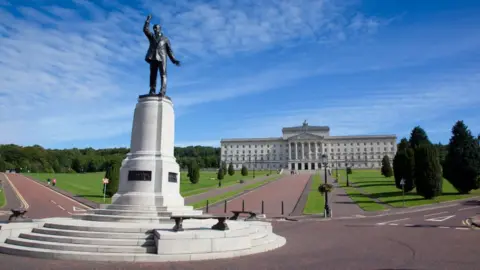 Getty Images/Eye Ubiquitous
Getty Images/Eye UbiquitousSince devolution as we know it today began in Northern Ireland 22 years ago, Stormont has been without a functioning government for 35% of its lifespan.
A series of resignations, suspensions and stand-offs have interrupted power-sharing, sometimes for years at a time.
Its record of dysfunction may be about to get even worse as Stormont lost both of its leaders earlier this month.
Without its first and deputy first ministers in place, much of Stormont's decision-making power grinds to a halt.
BBC News NI looks back at the stop-start nature of Stormont and the rows that have brought the house down.
When did power-sharing begin at Stormont?
The current Northern Ireland Assembly was established in 1998 as a result of the Good Friday Agreement, but government ministers were not appointed until the following year.
Devolution took shape as Northern Ireland emerged from decades of violence known as the Troubles and there were serious teething problems as unionists and nationalists got to grips with sharing power.
The first locally-elected ministers took charge on 2 December 1999, which was just over 22 years and two months ago, (or 8,108 calendar days to be precise).
But from the outset, the new government was beset by battles over when the IRA would give up its weapons, a controversy which almost strangled it at birth.
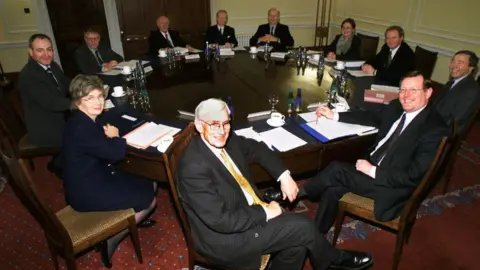 Getty Images/PAUL FAITH
Getty Images/PAUL FAITHWho is in charge at Stormont right now?
Stormont is usually governed by a team of 10 locally-elected ministers who are collectively known as the Northern Ireland Executive.
That executive must be led jointly by a first minister from Northern Ireland's biggest political party and a deputy first minister from its second largest party.
However, Paul Givan from the Democratic Unionist Party (DUP) resigned as first minister on 4 February in protest over post-Brexit trading arrangements.
Under Stormont's power-sharing rules, his resignation meant Sinn Féin's Michelle O'Neill automatically lost her position as deputy first minister.
The other eight ministers are still working in their own departments, but they cannot meet as an executive in the absence of a first and deputy first minister.
More importantly, executive ministers cannot take any major new decisions without the two leaders.
It has caused complications for lifting coronavirus restrictions and means that the budget for the next three years cannot be approved, and that has far-reaching implications for the health service.
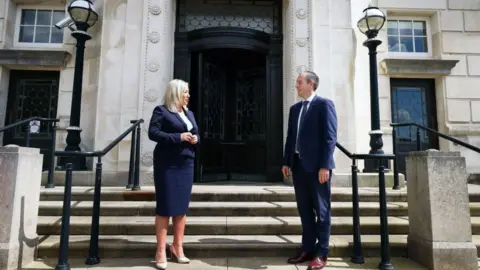 Getty Images/Charles McQuillan
Getty Images/Charles McQuillanHas Stormont been suspended?
No, not this time. Its government departments are still running and assembly members are continuing to debate and pass legislation.
However, the loss of the first and deputy first ministers means the executive is no longer functioning.
This week, we learned that Stormont will be allowed to stagger on in this manner for the next three months, until its next election which is expected on 5 May.
That is due to new legislation passed at Westminster this week aimed at stabilising power-sharing, which allows the assembly to continue without an executive for at least six months
Suspension and a return to direct rule from Westminster are seen as a last resort and in more recent years, various procedures have been used to avoid complete collapse.
After the last election in 2017, it took nearly three years to form a government.
The 90 newly-elected assembly members kept their seats and most of their salaries, but could not pass laws or hold debates during that period.
With the civil service running public services in the absence of an executive, legislation was passed in 2018 to allow civil servants more flexibility to take decisions without ministers.
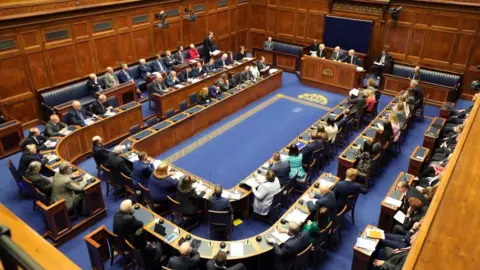 Getty Images/Kelvin Boyes
Getty Images/Kelvin BoyesWhy do NI ministers give up their powers so often?
Tactical resignations at the very top of Stormont have been used since the very early days of devolution.
Parties have taken advantage of a previous rule which stipulated that when Stormont's leaders quit and were not replaced, there would be a six-week deadline before the assembly would be dissolved for a fresh election.
But it is not just leaders who can quit or threaten to quit.
At one stage in 2015, DUP ministers were resigning and being reappointed every week, in a tactic which Sinn Féin criticised as a version of the Hokey Cokey.

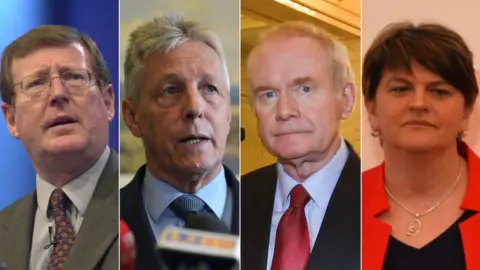 Jeff Overs/Getty Images/Pacemaker
Jeff Overs/Getty Images/PacemakerTimeline of stand-offs and suspensions:
- 2 December 1999 - Stormont's first generation of ministers take up their posts as the new executive meets for the first time.
- 11 February 2000 - After just nine weeks, the executive is suspended by Secretary of State Peter Mandelson because of the lack of progress on IRA decommissioning.
- 30 May 2000 - Devolution is restored after three and a half months (109 calendar days) as the IRA pledges to put its weapons beyond use.
- 1 July 2001 - First Minister David Trimble resigns over IRA decommissioning but nominates UUP colleague Sir Reg Empey as acting first minister, triggering a six-week deadline to fix the impasse.
- 11 August 2001-Secretary of State John Reid suspends the devolved institutions for 24 hours, giving the parties a further six-week window to resolve the decommissioning dispute.
- 22 September 2001- A second 24-hour suspension of the Northern Ireland Assembly comes into force as John Reid warns parties it is the last chance to break the decommissioning deadlock.
- 15 October 2002 - John Reid suspends devolution again after police raid Sinn Fein's Stormont offices as part of an investigation into allegations republicans were spying on the government.
- 8 May 2007 - Devolution is restored after a gap of almost five years (1,666 calendar days), during which Northern Ireland was governed via direct rule from London.
- 10 September 2015 - The DUP's Peter Robinson steps aside as first minister and pulls all but one of his ministers out of the executive amid accusations of IRA involvement in a 2015 murder.
- September - October 2015 - The executive continues working through the crisis so reappointed DUP ministers begin a policy of rolling resignations, staying in office for only a few hours each week to prevent other parties from taking over their departments.
- 9 January 2017 - Sinn Féin's Martin McGuinness resigns as deputy first minister in protest over the DUP's role in a controversial renewable energy scheme, causing the executive to lose its powers.
- 11 January 2020 - Devolution is restored again after three years of paralysis (1,097 days) as the parties sign up to the New Decade, New Approach agreement, designed to stabilise power sharing.
- 14 June 2021 - Arlene Foster resigns as first minister due to an internal DUP revolt but Sinn Féin refuse to go back into government with her replacement unless there is progress on Irish language legislation. A deal is done and the DUP's Paul Givan becomes first minister three days later.
- 4 February 2022 - Paul Givan resigns as first minister in protest over the Irish Sea border, triggering the automatic resignation of the deputy first minister.

